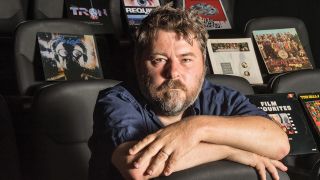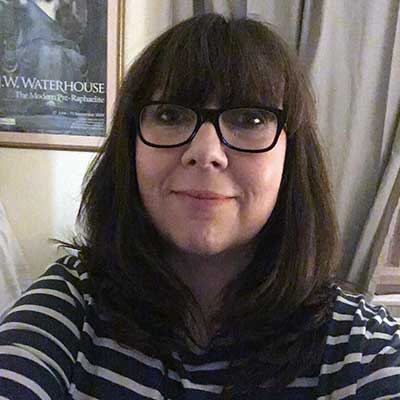“I grew up with music and my first choice is The Beatles – not just because it’s Sgt Pepper but because it’s my dad’s copy. The stuff we do [as filmmakers] is about designing sound for cinemas. This is the mono copy and, as pop music, was designed to be heard on a Dansette or on quite shitty hi-fi gear as no one had anything expensive at that time so it sounds quite thin and flat in comparison to the reissues you hear now. We didn’t have a lot of records but I like that my parents would have listened to this and I can hear the exact sound that they did. I’ve listened to this all my life and up to about 1990 it always sounded modern and experimental.
It maintained relevance up to when I was buying my own records, during the baggy era. I was born in Essex and we moved to London when I was eight. I was too young for punk and in 1989/’90 I was in sixth form, getting ready for college. I didn’t have a car so I couldn’t do the raving in fields and things like that, but was buying indie dance stuff and I was a big fan of Happy Mondays, whose style somehow tied back to The Beatles.
I got my musical inspiration from John Peel’s radio show, including Happy Mondays. Some of their stuff, like the Madchester Rave On EP, I picked up at WH Smith in Finchley Road, where I worked. I bought this Peel Sessions record at Record & Tape Exchange in Camden, second hand. It’s a fucking weird EP, not the quintessential Mondays sound from the albums I knew, like Bummed and Pills ’N’ Thrills And Bellyaches. This was their attempt at pop music and it’s quite confusing [laughs]. I like that Kuff Dam is ‘mad fuk’ backwards – all these odd little touches made me a lifelong Mondays fan.
The Fall are a Peel band. On Telephone Thing they meet the baggy sound – they’ve got that drum beat which is like Stone Roses’ Fool’s Gold. This is late Fall for me. The Frenz Experiment, I Am Kurios Oranj and Extricate was my main period. I’ve dipped in and out with them and still do, but it all started when my mate Dom told me, ‘I’ve found a band that sounds like the devil,’ and it was the album Bend Sinister. Frenz Experiment was more me – it was The Fall scrubbed up, quite electronic and, musically, slightly meeting with New Order.
- Meet the best turntables for your record collection
- Smaller budget? No problem! These are the best budget turntables
I listened to all sorts of things, such as my dad’s crappy, back-of-the-Sunday-Times-magazine record club stuff. He had these massive box sets of Mozart and Haydn that would just turn up. I’d listen to that, mixed with pop stuff, Peel stuff and things that a family friend would tape for us, such as Doors albums. I didn’t buy a lot of records as I didn’t have the money, but car boots were good and around that time you’d find records thrown out in skips. Swiss Cottage library was near to us and that was really good, so I’d get things out of there, tape them, then take them back. I’d also tape off pirate radio – which is more prevalent if you’re in a city – discovering tons of music from just tuning up and down on the FM dial.
I got the soundtrack to The Cook, The Thief, His Wife & Her Lover when it came out, at Rhythm Records in Camden. It was the first soundtrack album I bought. I hadn’t been struck by soundtracks yet but I thought this was so extraordinary when I heard it on the film. It’s amazing, I’d never heard any music like this, modern classical stuff. Later, I found out Michael Nyman had composed some of the music as a memorial for the Heysel Stadium disaster. This album makes your IQ go up when you play it. If you have it on at a dinner party, it becomes this incredibly modern gathering of sophisticates rather than a bunch of herberts eating spaghetti.
The film itself was pretty spectacular and it made me listen to a lot more Nyman, as well as other soundtracks. Influential ones for me are Tron – I’m a big Wendy/Walter Carlos fan – Clint Mansell’s Requiem For A Dream and John Carpenter’s classic Assault On Precinct 13. I really like the whole director/composer thing and Carpenter single-handedly invented electronic soundtracks. I saw him perform last year. It was really good, and he’s the only person who can play those 40s-style horror chords that should be really, really cheesy but he gets away with it.
- The 10 best horror films (you haven't seen) to watch this Halloween
- The Top 10 Essential Horror Movie Soundtracks
- The TeamRock+ Singles Club
- TeamRock Radio is back. But after what happened, why have we kept the name?
I include Beak here too, as I came to them after finding Drokk, the score to Dredd that was never used and is like a lost Carpenter soundtrack. They’re the only contemporary band I listen to, and I ended up working with Geoff [Barrow] for the score to Free Fire.
You get a lot of bizarre compilation albums of Ennio Morricone stuff. I bought Film Favourites recently – it’s all sorts of bits and bobs. There’s something very different about Morricone’s scores – from thrillers to porn, he’s the master of the weird instrument and the men’s choir. If you sit down and think about what instruments are being played, it’s just bizarre – sometimes the whole thing is done with whip cracks or some sort of percussive vocal. When I started watching movies, I was very naïve about how things worked and it took me a long time to understand that quite an average film could be made incredible by a Morricone score.
Tangerine Dream invented electronica, basically. I’ve got all their albums up to the 80s, then I run out of steam. Thief is beautiful. It’s a hardcore genre movie and Michael Mann’s second film, but teamed with this transcendental synth score that was kind of de rigueur in the 70s and early 80s. You look at these now and they’re like art films, not something you’d rent from the video shop. This is a treat for me. I bought it recently online, a reissue by the label Audio Fidelity. All the Werner Herzog stuff Tangerine Dream did was amazing, and The Keep. That full soundtrack is still unavailable – it got smashed to bits, cues missing all over the place, and has only ever been released in part.
The most modern piece of music I have is the soundtrack to Minecraft by C418 [composer Daniel Rosenfeld], perversely, on vinyl. It’s an ambient-y, piano-y thing but it’s a weird thing to separate from the game itself, which I play tons. As part of the whole experience it’s really joyful, then you use it as a soundtrack to your own life and it’s odd, crossing from the virtual world into the real one.
A soundtrack album is the thing that should never be – without a film, the music doesn’t make any sense. C418’s quite an interesting chap, though, very opinionated about where electronic music should go. Minecraft is an open sandbox, so the music has to be floaty. Context triggers style, so there’s different music for being on a hill or wandering into a tunnel.
I’ve got a lot of game soundtracks and I find that an interesting world. Games are like a bit like starring in your own films…”
Free Fire is out on August 7 and is available on DVD, Blu-ray and download. You can follow Ben on Twitter: @mr_wheatley
Marc Riley lets us take a look through his record collection
We take a look through Steven Mackintosh's record collection
Veep writer Will Smith gives us a look at his record collection


